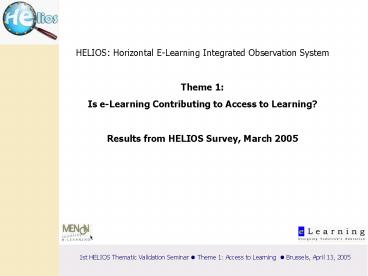DELOS Short Lists of Indicators PowerPoint PPT Presentation
1 / 12
Title: DELOS Short Lists of Indicators
1
HELIOS Horizontal E-Learning Integrated
Observation System Theme 1 Is e-Learning
Contributing to Access to Learning? Results from
HELIOS Survey, March 2005
2
Survey overview
- Part 1 Respondent Profile
- Part 2 Contribution of e-Learning to Access to
Learning - Part 3 Role of Investments in Access
- Part 4 Community/collaborative v. Individual
e-Learning - Part 5 Role of e-Learning Policies Initiatives
- Part 6 Trade-off between Access and Quality of
e-Learning
3
Part 1 Respondent Profile
- Survey period 7 March 1 April 2005 Conducted
online through ETV in 5 languages - 1,937 usable responses received an ETV record!
- 80 of responses from EU25 5.5 from 4 Candidate
Countries - Of EU25 14.5 - UK 12.4 - Italy 11.6 -
Germany 8.8 - Greece 7.6 - Spain 6.5 -
France 6.1 - Portugal - 16 were Users of Education and Training-
- 7.2 in a professional environment
- 6.8 in an educational environment
- 2.3 in a home environment
- 57 were Practitioners-
- 24 Teachers/trainers
- 15 Training admin/HR manager
- 9.5 Training materials development
- 9 Training programme design
- Rest were 12 in Research 9 Policymakers 5
Other
4
Part 2.1 Effect of improvements in technological
infrastructure on opportunities for accessing
learning
5
Part 2.2 What has been the effect so far on the
opportunities for accessing learning of excluded
groups?
6
Part 2.3 Does e-Learning have the potential to
improve the opportunities for accessing learning
of excluded groups?
7
Part 3 Role of Investments in Access
8
Part 4 Community/Collaborative versus
Individual Learning
9
Part 5.1 Involvement in special
programmes/initiatives on e-Learning
10
Part 5.2 Do policies aimed at fostering
e-Learning lead to more people participating in
education/training in general?
11
Part 6 Trade-off between Access and Quality of
e-Learning
12
Conclusions Further Work
- Strong belief that technology has resulted in
more opportunities for accessing learning in
general - But to date the beneficial effects on excluded
groups have yet to be fully realised, although
there is optimism that in time this will be the
case. - Increased access to learning founded mainly on
quality of course content and delivery (via
better trained teachers) . The role of ICT
(better software packages ICT equipment) judged
less important. - Group learning/e-Learning still considered to be
more effective than individual learning/e-Learning
- Widespread involvement in special e-Learning
programmes/initiatives, though majority view is
that such policies have only a limited impact on
achieving greater participation in education
training - Advent of e-Learning has had a positive influence
in particular on flexibility of learning routes
and access and participation in learning. - But e-Learning still needs to overcome personal
support barriers and improve quality of course
content and evaluation. - Further Work more in-depth analysis by type of
organisation (public/private) and country (sample
size permitting). Results to be incorporated into
Thematic Report.

